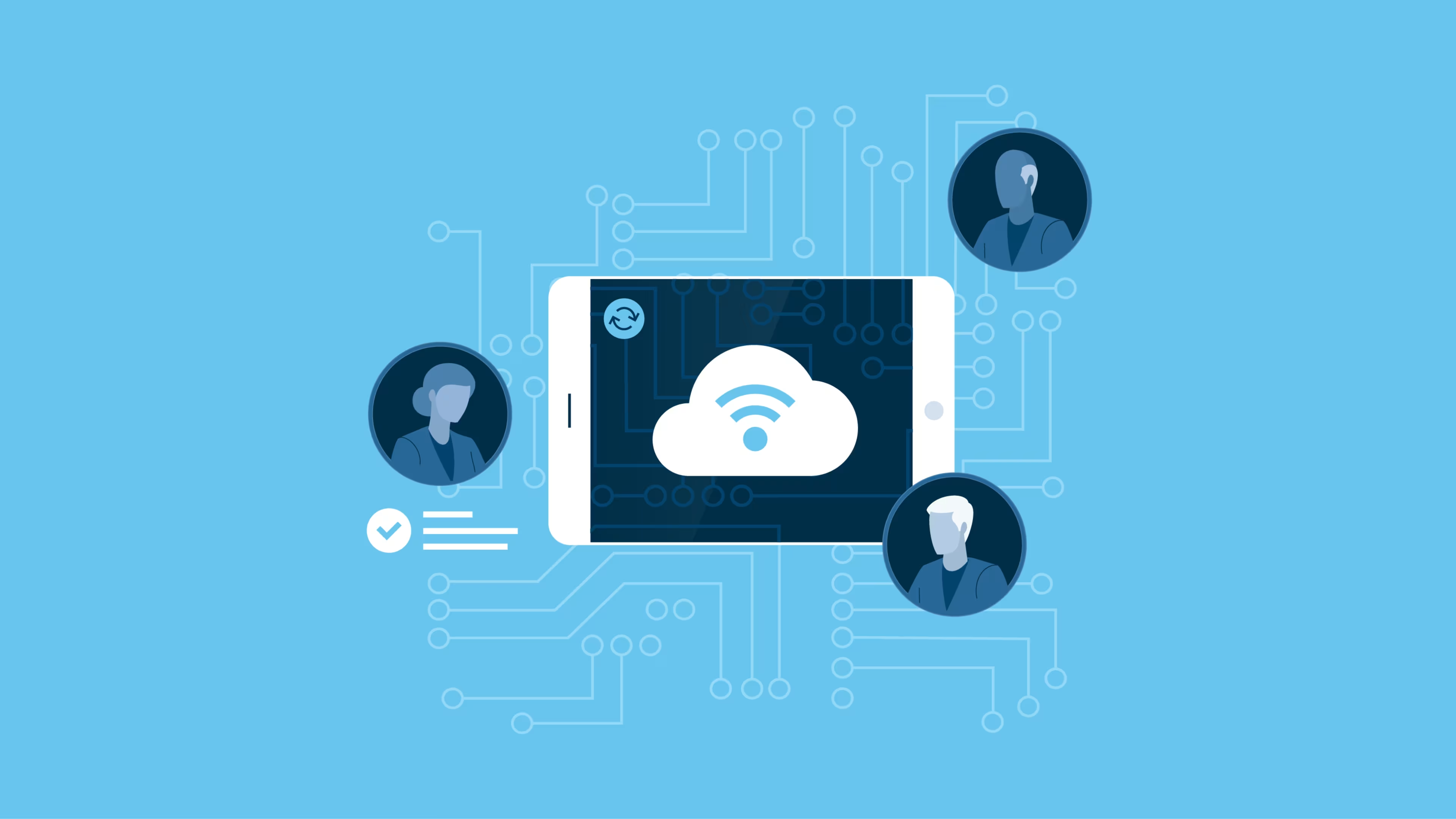Learn about outsourcing cloud computing, its pros and cons, and what to ask a provider.
There are many benefits to cloud computing, including cost savings, flexibility, and scalability, and it's a popular choice for many businesses. In fact, over 50% of corporate data was stored with a cloud provider in 2021[1].
What is cloud computing?
Cloud computing is the ability to access software, services, and resources via the internet. Cloud computing removes the need to have large programs installed on in-house devices. As long as there is an active internet connection, users can access cloud computing services at any time. Many are accessible remotely from other devices. Cloud computing can help users across multiple locations access the same data or work on a single project via multiple apps.
The uses of cloud computing for businesses are numerous, from an initial transfer of data and services to automating company activities via the cloud. Many businesses prefer to outsource some of their cloud management capabilities in order to consolidate their IT resources.
What is cloud outsourcing?
A cloud outsourcing provider delivers managed cloud services for businesses. When a business chooses cloud outsourcing, they get all the benefits that come with cloud computing along with a dedicated team that manages their cloud services.
These providers can design elastic architectures in the cloud and migrate your current infrastructure and legacy applications to the cloud for you. Once they have your business processes and systems in the cloud, your provider's team will make sure they are all running at peak efficiency and handle maintenance tasks.
The managed solution provider will assess the way you currently use technology in your business and create a custom solution using one, two, or all three types of cloud computing service models.
Ready to hire cloud consulting services for your business needs? Browse our list of companies in the following areas:
Types of cloud computing service models
Each cloud computing model provides different types of services. The model a cloud outsourcing provider chooses to implement depends on the legacy systems they are replacing and their customers' technology needs.
Here are the three main cloud computing service models:
Software-as-a-Service (SaaS): With SaaS, a business buys fully functional software from a cloud provider on a subscription basis. The business' employees access the software via the internet, and the cloud provider manages all upkeep and maintenance.
Infrastructure-as-a-Service (IaaS): With IaaS, businesses purchase the infrastructure they need from a cloud provider via a subscription, and the infrastructure is delivered over the internet. These resources could include data storage, networking, servers, file storage, and more. The cloud services provider keeps all underlying hardware and software up to date.
Platform-as-a-Service (PaaS): With PaaS, a business rents a complete application development environment and tools from a cloud provider, which the business accesses via the internet.
What's the difference between traditional outsourcing and cloud outsourcing?
Some businesses outsource marketing, accounting, and other functions (such as IT) to third parties who complete all associated tasks as if they were an extension of the client.
With traditional IT outsourcing, businesses work with a third-party IT solutions provider that manages their data, servers, network, security, and more. The third-party is responsible for the functionality and upkeep of all services they supply. These providers are often known as managed service providers (MSP).
Cloud outsourcing is similar, but there are some key differences. A cloud outsourcing services provider still manages a business' IT solution, but they do so using cloud computing technology. Traditional MSPs may have their own data centers where they store client data.
With cloud outsourcing, a business gets the best of two worlds. The upkeep, management, and configuration of the technology they use are handled by a third party, and their applications, data, networking, databases, and more are hosted with a cloud provider. According to one survey of businesses using cloud outsourcing, 96% of companies were satisfied with the results[2].
Pros of cloud computing
Cloud computing has many benefits; here are some your business can take advantage of by choosing a cloud-managed service provider (cloud outsourcing):
Unlimited storage capacity
With a traditional IT infrastructure, more storage requires more hardware, installation, and maintenance. In the cloud, this infrastructure is readily available because the cloud provider has planned ahead for growth. Adding more storage happens with the click of a button, or can even be automated based on needs.
Automated backup/restoration of files and data
Another thing you can automate in the cloud is backups. Each time data is stored or files are uploaded, a redundant copy can be created and stored securely. If anything ever happens to live production data or files, this copy can replace the original in a matter of seconds.
Reduce infrastructure costs
This is one of the main reasons businesses choose cloud outsourcing, as hardware is the responsibility of the cloud services provider. The end user doesn't have to buy, maintain, or fix hardware-related issues, which can lower ongoing costs.
Cons of cloud computing
Most of the cons of cloud computing can be solved through the correct configuration of cloud resources, so with the right cloud services provider, they won't be an issue. But it's always better to be prepared, so here are a few to be aware of:
DoS attacks, data loss, and theft
When you store your data on a server you don't control, you are trusting its security to a third party. You could also be just as susceptible to DoS attacks as you would be if you hosted your technology in-house.
Fortunately, most data loss and theft on the cloud are due to misconfiguration, which often happens with users new to the cloud but rarely with experts (such as the staff of a managed services provider).
Technology vulnerabilities, especially in shared environments
There are some hazards involved with sharing a cloud provider. Unauthorized access via poor access restrictions and the abuse of employee credentials are among the most common cloud security problems.
These issues usually occur when cloud resources are misconfigured or user passwords don't comply with security standards, and can be mitigated by following best practices.
Dependent on an internet connection
Cloud computing does require an internet connection to work, meaning your service can be affected by internet outages. On the provider side, this is a rare concern as cloud service providers use redundant resources, and resources that fail are replaced on the fly.
If the internet connection for a business using cloud services goes down, employees can often still connect to the services via a cellular data connection.
How to choose a cloud service provider
It can take time and work to migrate a business's technology to the cloud, so it is important to vet providers and choose one that fits your business. Here are some topics to focus on, and questions to ask as you explore cloud outsourcing:
Service-level agreement (SLA): Will the service provider supply an SLA that guarantees the uptime of your system? What other details are included in the SLA? Make sure to examine it thoroughly.
Scheduled maintenance: How will your service provider handle scheduled maintenance and mission-critical events? What do they do if a data breach occurs?
Recovery and backup: Does the provider supply disaster recovery as a service? What is their continuity plan?
Security: The questions you ask your provider about cybersecurity are among the most important. How do they handle it? How big is their team? What type of physical security do they use at their data centers?
Compliance: If you have to store data that falls under compliance standards such as PCI or HIPAA, make sure your provider can store this data according to regulations.
Scalability: How does the provider handle changes in traffic and usage? Can you adjust it yourself, or will it scale automatically? If you experience usage surges, you will want to choose an auto-scaling option.
On-site services: After cloud migration, will some of your data, hardware, or software remain on-premise? If so, will the provider train your staff and show them how it integrates with the cloud infrastructure?
Customer service: The provider should be available when you need them. Do they have teams working 24/7 to handle issues and customer service requests?
Ready to hire a cloud consulting agency for your business needs? Browse our list of top cloud consulting agencies, and learn more about their services in our hiring guide.
Want to learn more?
Cloud outsourcing can be an efficient, cost-effective solution for your business' IT needs. While cloud computing gives businesses the ability to use resources, software, servers, databases, etc. without needing to buy hardware or maintain software, outsourcing cloud computing management takes even more of those maintenance responsibilities off of your plate.
If you're still deciding whether cloud computing is the right direction for your business, check out these helpful resources:

